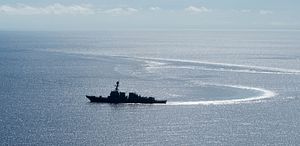Last week, in a submission to the United Nations, Australia affirmed that it believes there to be “no legal basis” for China’s territorial and maritime claims in the South China Sea, dismissing China’s claim to “historical rights” over the region as inconsistent with the UN Convention on the Law of the Sea (UNCLOS). With this submission Australia was seeking to internationally consolidate the recently hardened position of the United States that China’s activity in the region is “completely unlawful.” Even while aligning itself with the U.S. position, Australia should be concerned by the manner with which the United States is currently dealing with China.
As Australia’s position on the South China Sea evolves, Canberra’s foreign and defense ministers have just arrived in Washington to meet with their U.S. counterparts for AUSMIN, the formal consultation between the two countries that is effectively now held annually (in 10 of the last 11 years). Undoubtedly discussions will revolve around how Washington and Canberra can continue to approach China’s recent assertive behavior, both in the South China Sea and more broadly.
Despite Australia’s closer alignment with the United States on this particular issue, there are obvious differences in approaches between Canberra and Washington with regard to China, especially given the tempestuous nature of the Trump administration. The recent speech by U.S. Secretary of State Mike Pompeo, which cast doubt on the benefits of the U.S. shift to recognize and engage with the People’s Republic of China in the 1970s, likely raised eyebrows in Canberra. It is doubtful that Australia would see its own shift to recognize and engage with the PRC in the same light.
Australia would undoubtedly see its trading relationship with China as having been greatly beneficial to the country, as has the contribution of Chinese-Australians who have been afforded the freedom to migrate to Australia as China opened up to the world. The Australian government has a far more nuanced position on its current relationship with China, understanding the reality to be more complex than the strict binary worldview that Pompeo established in his speech.
The idea that the Chinese people should have remained in poverty in order to prevent the PRC’s current assertive capabilities is not a sophisticated argument to make. The West has indeed been naïve about how committed the Communist Party was to maintaining their absolute authority at home, and how this translated to the subverting of a rules-based international system in an attempt to establish a deferential system abroad. Yet China’s decades of pragmatism, prior to Xi Jinping, did present the idea that China could be a restrained and responsible great power.
This presumption has clearly now passed. However, the true measure of a government’s seriousness and competency lies in how they approach conditions in the present, rather than dwelling on past “what ifs.” While the Trump administration’s pushback against China’s more aggressive posture under Xi is not unwelcome in Canberra, the chaotic and inconsistent manner in which Washington pursues this policy is problematic for Australia. This is in distinct contrast to the more sober and measured firmness that Canberra prefers.
Australia’s position on the South China Sea is primarily a recognition of the adverse effects for Australia and the wider Indo-Pacific region should China’s “might makes right” approach fully succeed. Yet also aligning its stance closely to the United States maintains its consistent commitment to the alliance with Washington. Despite the recent announcement of a new investment in its deterrence strategy, Australia still sees that it has little choice but to remain close to the United States, no matter how turbulent the current administration is, at home and abroad.
But in this approach there is something important to highlight. While Trump may not place any value on alliances, Australia does. Australia sticking by the United States through this dark and difficult period in its history is a demonstration that the alliance is not simply about elected governments, but is a bond between people. It is a signal that the difficulties created by the Trump administration’s discord are not reflective of Australia’s view of the wider American public.
That said, although no one in the Australian government will admit to it, arguably many are desperately hoping for Joe Biden to win the upcoming presidential election, and that the election process is able to run smoothly. The situation with China’s assertive actions throughout the Indo-Pacific is far too consequential for Australia to continue with a senior alliance partner that simply tries to match the verbal bluster of the CCP, and isn’t actually interested in developing the frameworks that could regulate China’s behavior.

































